Dear Berkeley Journalism community:
At the end of the day, we all want to know that our efforts mean something.
Often people ask me: Does supporting a journalism student truly have an impact on journalism and bringing diversity to newsrooms? And if so, how? This question has been on my mind since starting here as dean four years ago and central to all that I continue to do.
My resounding answer is yes and here’s why.
As you may know, Angela Filo (’99) and her husband, David Filo, made the largest gift pledge to Berkeley Journalism in our 56-year history. With their pledge of $10 million over five years, Angela and David join a community of supporters whose generosity has made it possible for us to double the scholarship support we’re providing students. This puts us on the path toward Berkeley Journalism’s ultimate goal: a debt-free education for all. This is how we change who gets to be a journalist, by connecting affordability and equity.
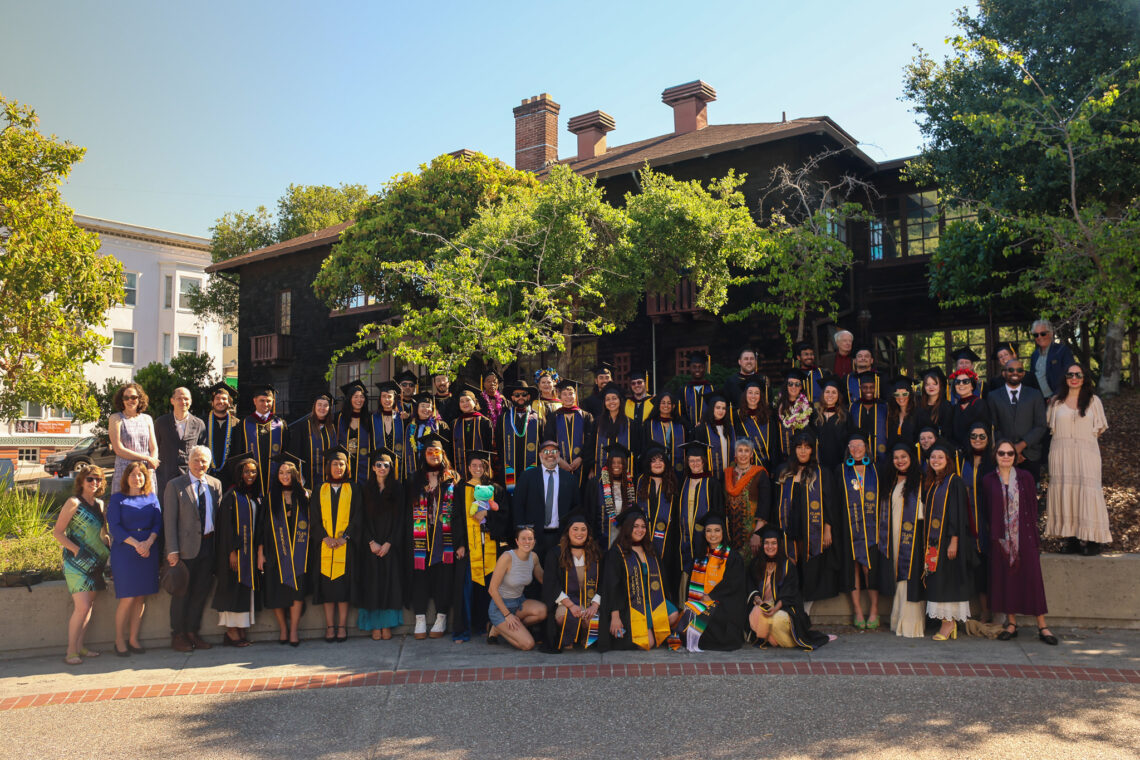
Warm congratulations to the Class of 2024 and their instructors!
The result of this historic boost in scholarship funding is already clear: in this admissions cycle, more than half of our top applicants accepted.
Forty percent of our domestic students are the first in their families to attend a four-year college and nearly half are California residents. They identified racially in the following ways: white: 31 percent, Asian: 20 percent, Latinx: 16 percent, Black (including African and African American): 17 percent, South Asian: 8 percent, multicultural/multiracial: 5 percent, American Indian/Alaska Native: 1 percent. (Two percent declined to state.)
Our international students, who make up 34 percent of the class, will come from Cameroon, Ghana, Kenya, Nigeria, South Sudan, Tanzania, India, China, Taiwan, France and the UK. Ten international students (45 percent) are also the first in their families to go to college.
The additional fellowship funding made a dramatic difference in enabling us to recruit this diverse group of next-generation journalists. At the same time, we know that recruitment in and of itself isn’t enough and that improving students’ sense of belonging is critical to whether they continue in the field. With meditation, restorative justice and financial literacy programs, we’re transforming our internal efforts as well.
We also crowdsourced nearly $150,000 from dozens of friends and alumni to ensure that every student is paid for their summer internship work. Students (who are between their first and second years) are at India Currents, Northern California Public Radio, the Mississippi Center for Investigative Reporting, The Press Democrat, Bloomberg in Hong Kong, PRX’s “The World,” the Los Angeles Times, our own Investigative Reporting Program, and many other news organizations worldwide.
And yet, will the fellowships, internships, and journalism education change journalism? I believe it is already.
We’re seeding the field with talented new graduates who have versatile skills with perspectives from a vast array of backgrounds. They are entering a fragile and changeable journalism landscape in audio, doc, multimedia, from local to international news. Their eyes are wide open about the challenges in our field, but they are prepared to be journalists, fact-finders and storytellers.
This fall, twelve recent graduates will join the 75 early-career journalists in the second cohort of our California Local News Fellowship, working for two years at a local news organization while we support them through the $25 million state-funded program.
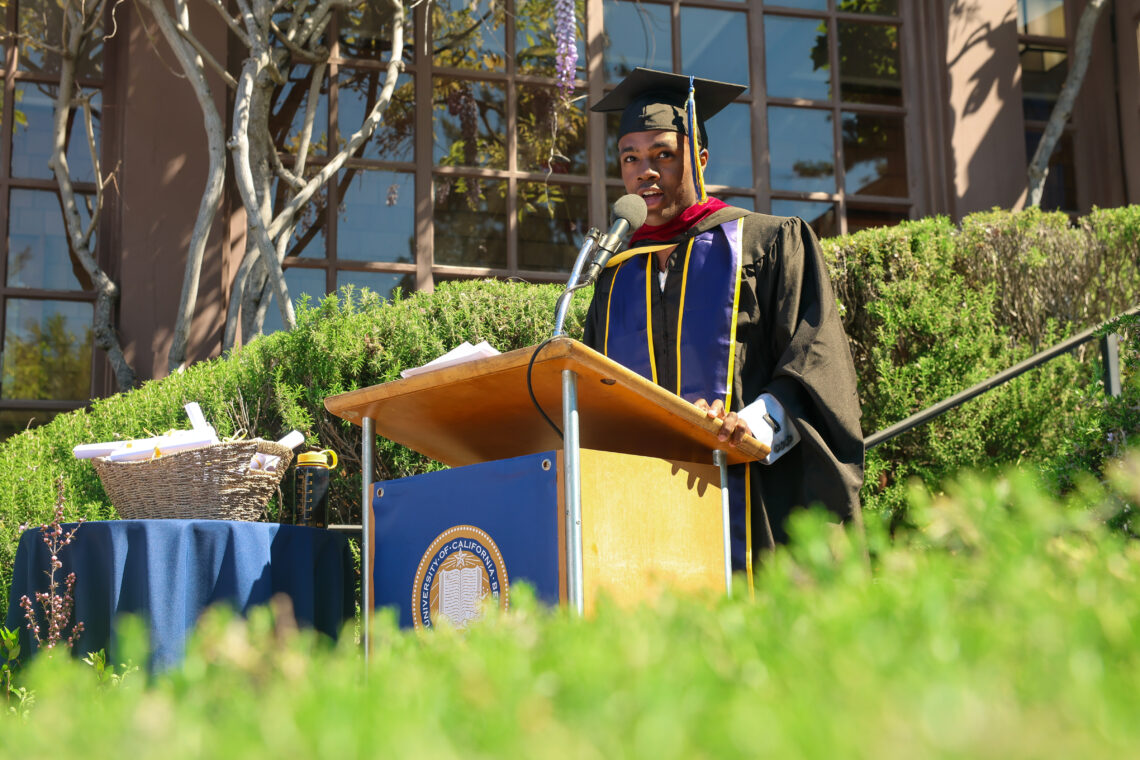
Student commencement speaker Jeremiah Rhodes.
With the critical challenges facing journalism and our world, this may not feel like enough. But I find hope in the words of one of our student speakers, Jeremiah Rhodes, who spoke to our beautiful graduates at commencement about how they might have a chance of saving the world, if they think collectively: “It won’t be one of us — but it can be all of us.”
Thanks for being “one of us,” for being part of that collective effort that Jermiah reminded us is the pathway to having an impact — whether it is saving local news, changing who gets to be a journalist or building a sustainable future for all of us.
Warmly,

Geeta Anand
Dean and Professor
What follows are some of the highlights from our prolific journalism community over the past few months. We share these snapshots knowing it is impossible for us to feature all of the accomplishments in this limited space. Please follow our social media channels to learn more about our community’s important work and accolades in real time. We ask for your grace if we have inadvertently left anyone out.
Class of 2024 soars
In his remarks at Berkeley Journalism’s 2024 Commencement last month, student speaker Jeremiah Rhodes (’24) spoke to his 51 fellow graduates in the North Gate Hall courtyard about collective responsibility and power: “I can’t tell you with any degree of certainty what will happen next in our world. But what I can tell you is that no individual is going to save it. It won’t be one of us — but it can be all of us. So maybe you don’t have the capacity to change the entire world. But you all and your beautiful stories have taught me that we each have the potential, and maybe the responsibility, to work in the hopes of changing our little piece of it. And what an exciting project to embark on. Together.”
Student speaker Tarini Mehta spoke about the North Gate Hall courtyard itself and the two things she found there: community and love: “The ability to accept that our world is broken and still choose everyday to build it back brick by brick could only come from a place of deep love for our communities, our society, our environment. And I feel grateful everyday that I am surrounded by people who house within them such passion, such idealism, such hope. May we always be hopeful, and may we always be brave enough to stand up for what’s right and speak out against what’s wrong, irrespective of where we are and who comes in the way.”
Documentary filmmaker and ITVS CEO Carrie Lozano (’05) talked about the importance of failure and how to grow from it: “It’s super helpful to know that the feeling of failure is not the same thing as failing. It’s part of being human. It’s part of growing. It’s necessary. It’s messy. It’s life.” Listen to Lozano’s keynote speech on the Berkeley Talks podcast, here.
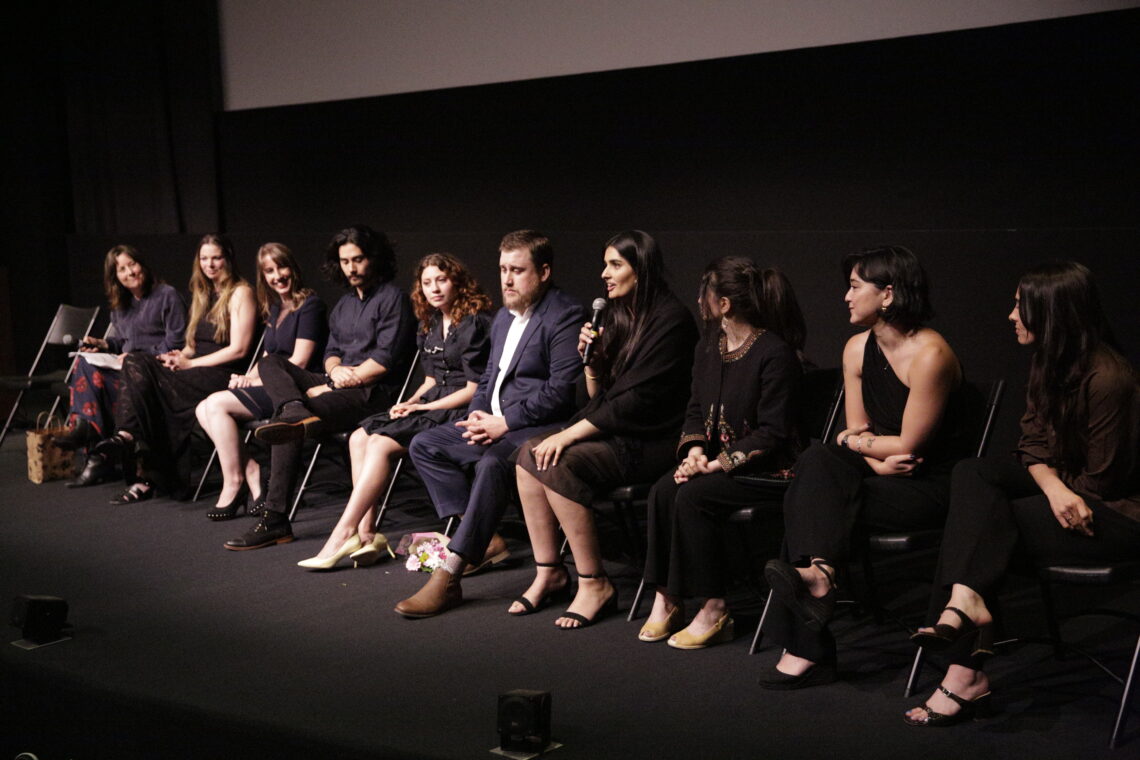
The graduate thesis showcase for documentary film students at BAMPFA.
The commencement ceremony itself capped a week of showcases — video and doc, audio, narrative, multimedia, and photography — that put on display the work and extraordinary skills of this class.
Alum of the Year, a Guggenheim, Pulitzers and more!
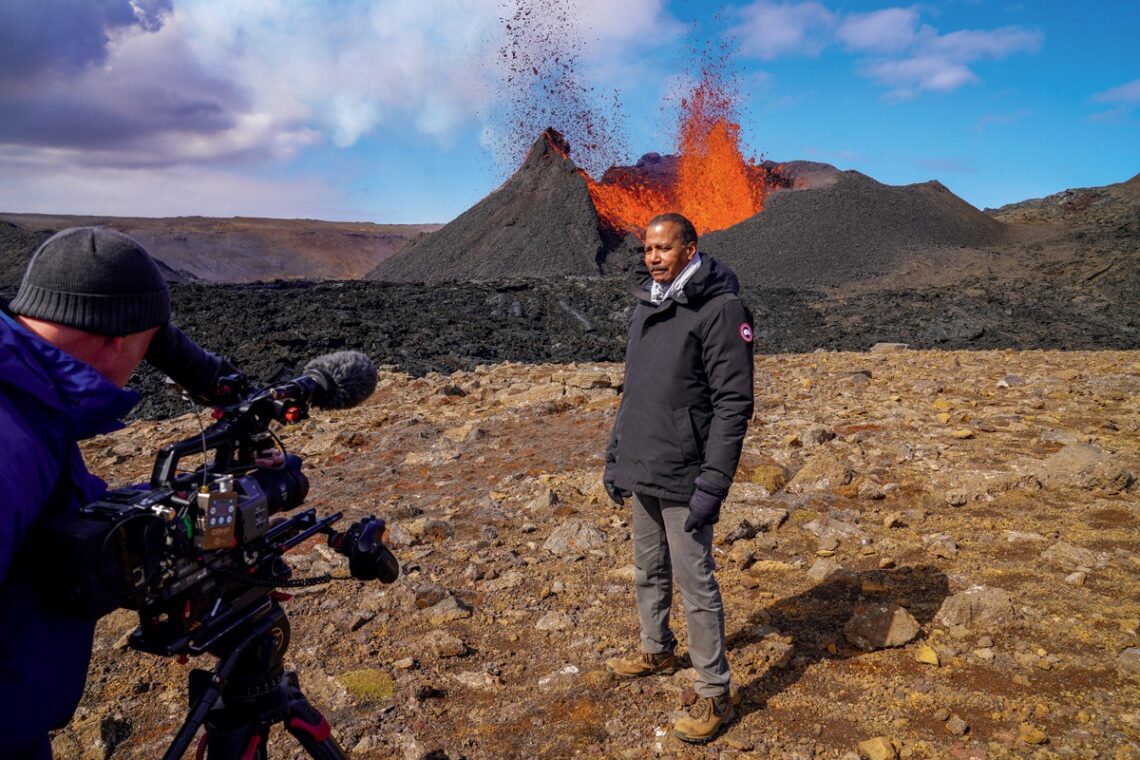
Bill Whitaker on location.
UC Berkeley selected “60 Minutes” correspondent Bill Whitaker (’16) as its “Alum of the Year,” an honor that was celebrated at a dinner with campus luminaries and a video that captured the vast respect and love for an icon of television journalism. “If I were to describe my dad in a few words, the first word that comes to mind is ‘beautiful,’” said William T. Whitaker, Bill Whitaker’s son, in the video that included tributes from colleagues and friends. Watch it here and read a profile of Whitaker — “The Bedrock of Good Journalism” by Francisco Martínezcuello (’21) — in California Magazine. Carrie Lozano (‘05) was also celebrated this year with the Campanile Excellence in Achievement Award.
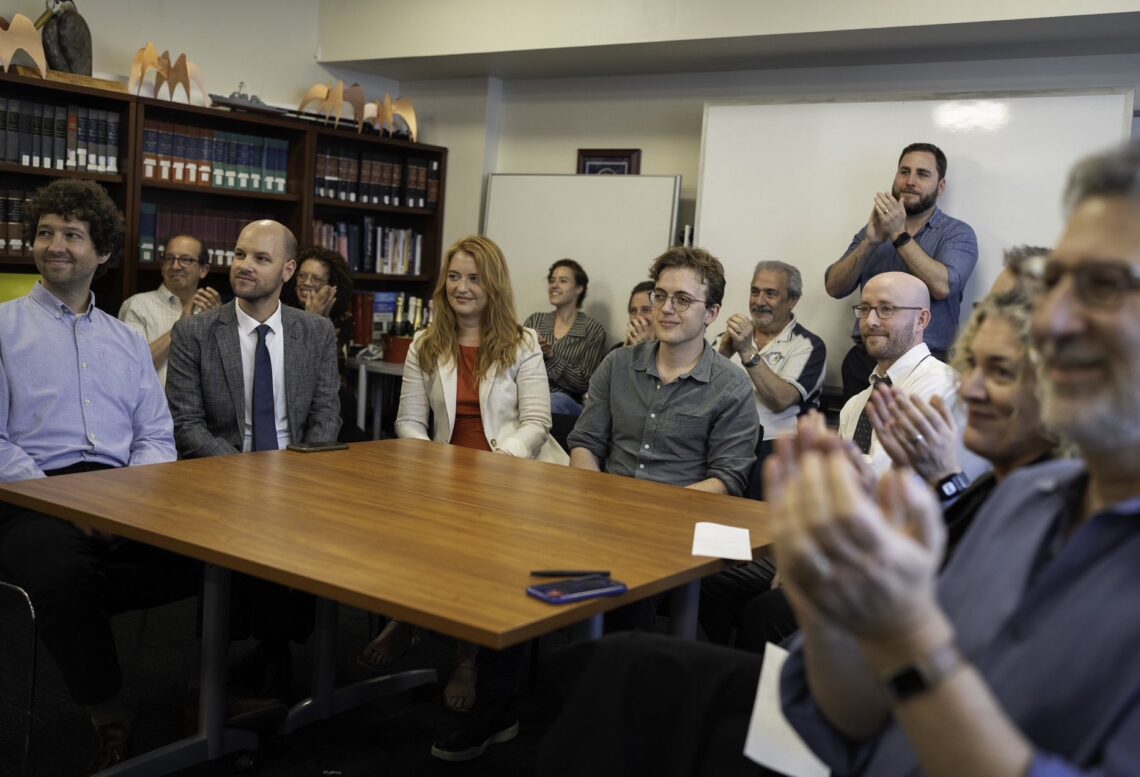
ProPublica reporters, seated from left, Alex Mierjeski, Justin Elliott, Kirsten Berg, Joshua Kaplan and Brett Murphy and Managing Editor Tracy Weber celebrate with staff after receiving the Pulitzer Prize for Public Service. Credit: Sarahbeth Maney/ProPublica
Brett Murphy (’16) was on the ProPublica team that won the 2024 Pulitzer Prize for Public Service for the “Friends of the Court” series that brought to light lavish gifts given to Supreme Court justices by a small group of billionaires. Murphy reached out to his alma mater to hire two Investigative Reporting Program (IRP) students Kathleen Quinn (’24) and Marissa Muller (’24) to do Bay Area-based research for the project. ProPublica’s Managing Editor Tracy Weber (’89) was an editor on the series. Sarah Cahlan (’19) was part of The Washington Post team that won the Pulitzer Prize for National Reporting for a series of stories about the AR-15, the rifle most commonly used in the nation’s deadliest mass shootings. John Harden, who led the multimedia track as a lecturer at Berkeley Journalism last semester, shares the Post’s honor. Brian Howey (’22) of Mississippi Today and The New York Times was named a Pulitzer Prize finalist for Local Reporting for his detailed examination of corruption and abuse, including the torturing of suspects, by Mississippi sheriffs and their officers over two decades. Howey was a student in Berkeley Journalism’s Investigative Reporting program and studied under four-time Pulitzer Prize winner Professor David Barstow. Read more about these stories and other J-School Pulitzer finalists, here.
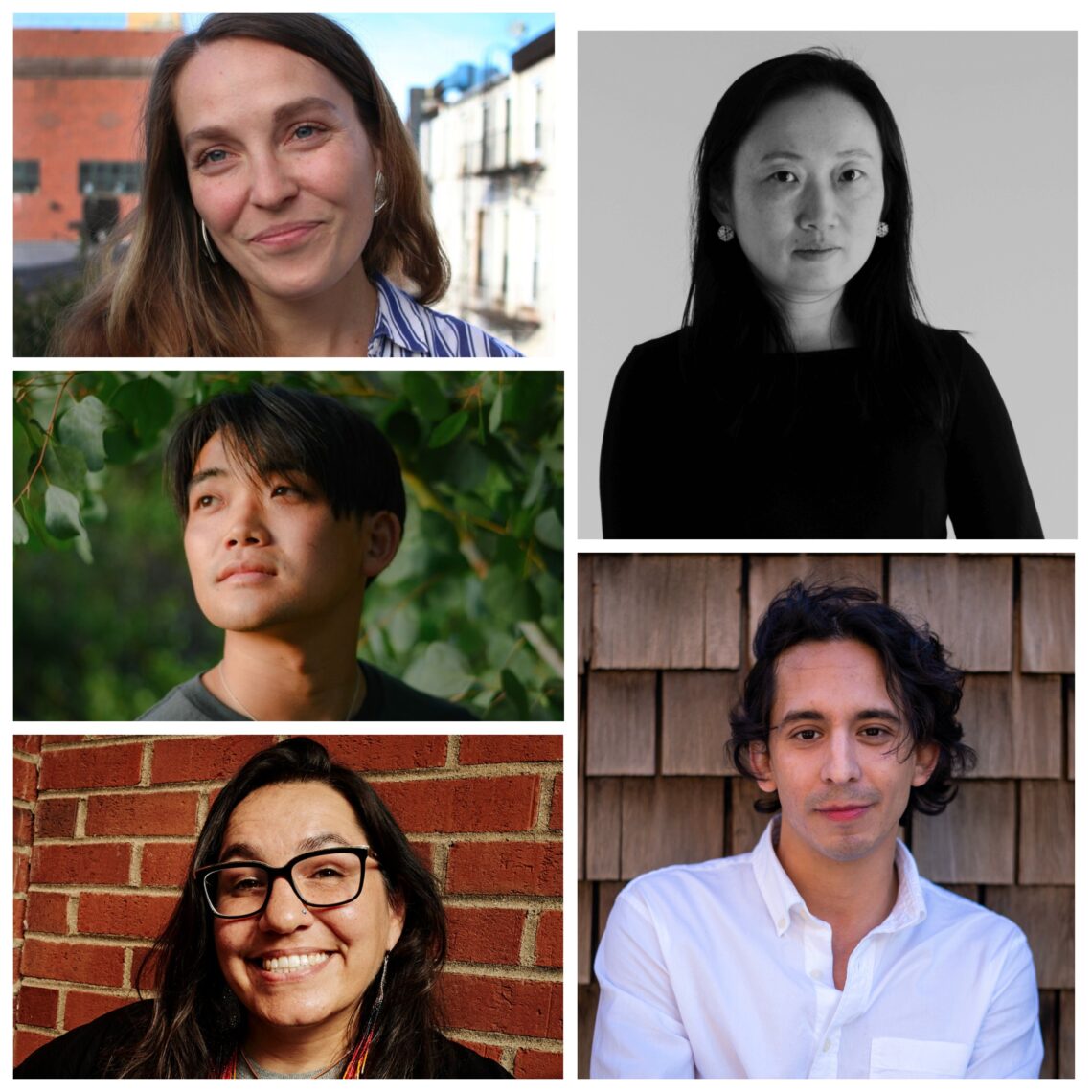
Clockwise from top left: Lacy Roberts, Violet Du Feng, Steven Rascón, Kathryn Styer Martinez and Kori Suzuki.
Five alums were nominated for Peabody Awards, an honor that celebrates the most compelling and empowering stories released in broadcasting and streaming media in 2023. They include: Violet Du Feng (’04), Lacy Roberts (’17), Steven Rascón (’22), Kori Suzuki (’23), Kathryn Styer Martinez (’23). Read about the nominations here.
Professor Jennnifer Redfearn won the prestigious 2024 Guggenheim Fellowship, which will enable support for new forms of visual storytelling, her documentary filmmaking, and working with journalism students to report on pressing challenges to humanity. Professors Mark Danner, Ken Light and Michael Pollan have previously been awarded Guggenheims. Read more here.

Clockwise from top left: Ari Sen, Brett Murphy, Bernice Yeung, Robert Lewis and Stephen Hobbs.
Four alumni of our Investigative Reporting Program and its managing editor Bernice Yeung were among those honored in the 2023 Investigative Reporters and Editors Awards in recognition of the year’s most outstanding watchdog journalism. Read more here.
Fellowship program boosts local news in California: 75 fellows and counting
The California Local News Fellowship has selected 36 journalists and 36 newsrooms across the state to participate in the second cohort of the local journalism program. The fellows will receive a salary and mentorship from the UC Berkeley-based program to work in a newsroom for two years. The fellowship program now supports 75 early-career journalists working at small and large newspapers, public radio stations and community and ethnic media outlets across 35 California counties.
“With a national crisis in local journalism upon us, every single one of these fellows and newsrooms is a sign of hope,” said Christa Scharfenberg, director of the California Local News Fellowship program. “We’re grateful to support the next generation of journalists and help invigorate a national movement for robust local news.” Read the announcement here.
16th annual Logan Symposium brings investigative journalism community together
Our 2024 Reva and David Logan Symposium on Investigative Reporting was a stunning success, bringing together hundreds of the world’s leading investigative journalists as well as newsroom leaders, media attorneys, academics and philanthropists who support journalism in the public interest. This year’s Symposium took participants behind the scenes on three investigations involving the ocean; explored what happens when law enforcement is lawless and discussed threats to local investigative reporting. Susan Chira, editor-in-chief of The Marshall Project, delivered the keynote. A third day of the symposium was co-hosted by the Human Rights Center at Berkeley Law and the Investigative Reporting Program, offering workshops on open source investigations.
Berkeley launches new Business Journalism program
This spring, we announced that Berkeley Journalism and Berkeley Haas — with support from Bloomberg News — are collaborating on a new Business Journalism program to strengthen knowledge and storytelling across the two disciplines. The schools are pursuing a formal joint certificate in Business Journalism, with the goal of strengthening reporting in a multifaceted field, pertinent to everyday lives. “We’re teaching students how to hold power accountable and usually power lies where the money rests — in the corporations that dominate our country,” said Dean Geeta Anand. Read more here.
Exciting new ‘video for web’ curriculum offerings
This fall, Berkeley Journalism will offer a new social video/video for web sequence to ensure students are ready for vast changes in the field and job market. Students with an interest in web-based video will learn skills such as interactive narratives, basic web, social/vertical video, motion graphics, news explainers, animation, smartphone video and more in the first year and may produce a thesis in the second year that incorporates all of these skills through our multimedia program. To make it happen, we’re purchasing small camera kits for students that are commonly used by news organizations for rapid, nimble reporting.
Announcing new senior leaders
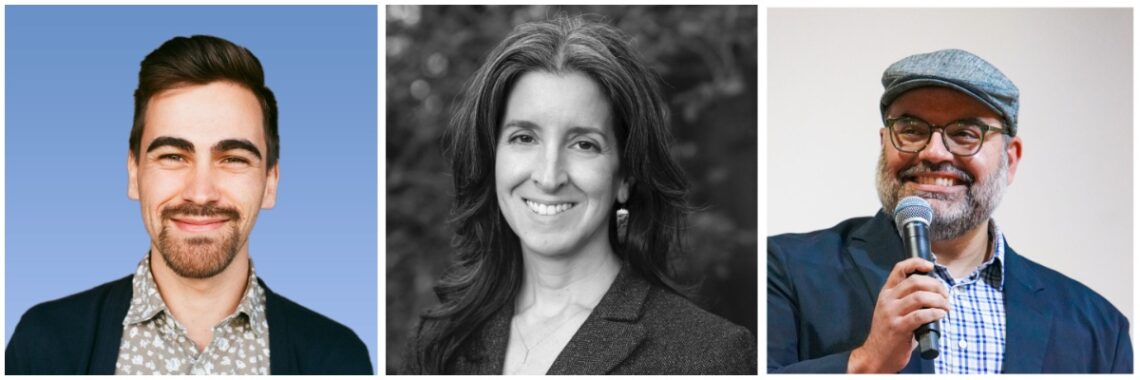
Jon Phillips, Elena Conis and Jeremy Sanchez Rue.
Berkeley Journalism recently announced the promotion of Jon Phillips to senior assistant dean and chief administrative officer. He replaces Amy Utstein, who is retiring. “Jon is among the most talented administrators I have had a chance to work with at Berkeley,” Geeta Anand, dean of Berkeley Journalism said. “He brings a collaborative spirit and good judgment, a brilliant mind and an empathetic heart.”
For the 2024/2025 academic year, Professor Elena Conis (’04) will step into an associate dean role, joining Professor Jeremy Sanchez Rue (’07) who will continue to also serve as an associate dean. Both will also continue to teach. “We are very lucky to have these two dedicated faculty members share their vast amount of expertise with our school community,” Dean Anand said. “This is an extraordinary commitment and an extraordinary gift to the school.”
Student News
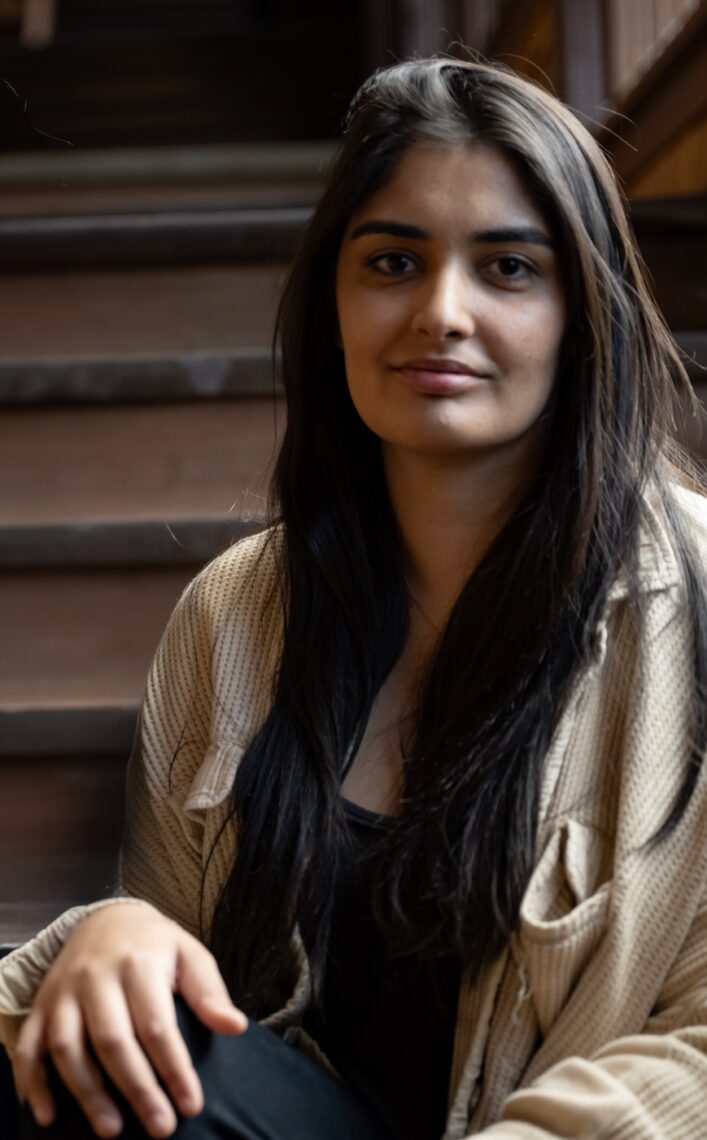
Misha Schwarz. Photo by Jule-Sofie Hermann.
Misha Kapany Schwarz (’24) was awarded one of Berkeley Journalism’s top honors, the Marlon T. Riggs Fellowship in Documentary Filmmaking. The $10,000 Fellowship is awarded annually to a second-year doc student to support the cost of their academic pursuits, including the production of their thesis film.
Jariel Arvin (’25) is highlighted in California Magazine in a story about the importance of fellowships for journalism students. “People don’t talk enough about how fun journalism is! I can’t think of a greater job or profession. It touches everything we do. Journalism is a public service,” Arvin said.
The Dow Jones News Fund is training 86 college students to work this summer in paid internships in 62 newsrooms around the country, including Agnee Ghosh (’25), who is working at India Currents in San Jose.
Celeste Hamilton Dennis (’24) published her audio thesis project on the nation’s oldest drag king on KQED, accompanied by photos by Florence Middleton (’24). The story was incubated in our audio lab with Professors Shereen Marisol Meraji and Queena Kim. Celeste also published her second thesis project on Caribbean LGBTQ+ asylum seekers, with the non-profit newsroom Documented.
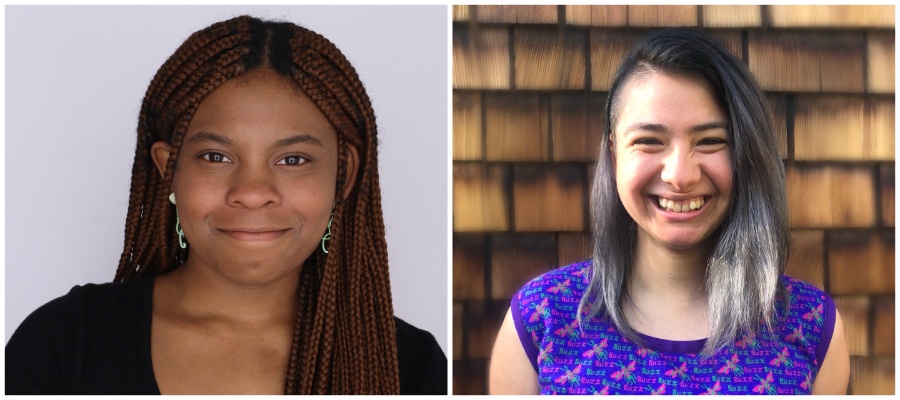
Nadia Lathan and Gisselle Medina
Gisselle Medina (’24) and Nadia Lathan (’24) have been named Report for America Fellows as part of a cohort of 60 reporters and photojournalists starting positions at local newsrooms across the country this summer.
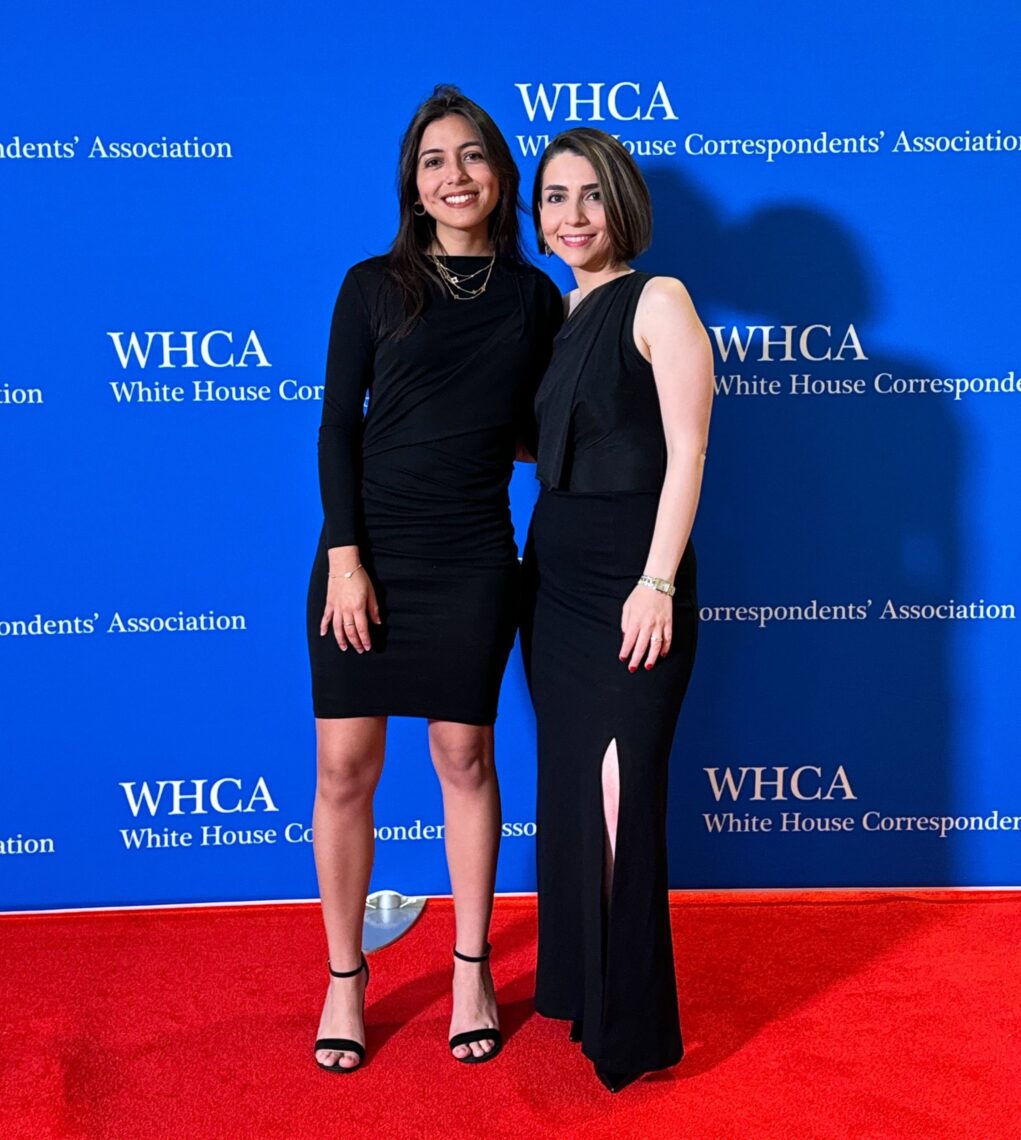
Coral Murphy Marcos (’24) and Negar Ajayebi (’25) on the red carpet at the annual White House Correspondent’s dinner in Washington in April.
Coral Murphy Marcos (’24) and Negar Ajayebi (’25) were honored by the White House Correspondents’ Association at a celebration in Washington, DC in late April. Ajayebi was awarded the White House Correspondents’ Association college scholarship in 2024 alongside journalism students from 16 colleges and universities nationwide. Murphy Marcos, who graduated in May, was awarded the scholarship in 2021, but not publicly celebrated until now.
Faculty News
Media ethicist Ed Wasserman published two recent op-eds in The San Francisco Chronicle: “A new media company wants to tip off financial partners on its investigations to make a profit. That’s not OK,” and “No, secretly recording Justice Samuel Alito at a public event isn’t a scandal.”
Jennifer LaFleur was a project editor/manager on an extraordinary new three-part series from the Center for Public Integrity and Reveal that explores the lesser-known legacy of American reparations that were given and taken away: “40 Acres and a Lie.”
Shereen Marisol Meraji will join journalist Ray Suarez and Jose Antonio Vargas onstage at the Commonwealth Club on July 9 to discuss the state of immigration in 2024, and how it will impact the 2024 presidential election.
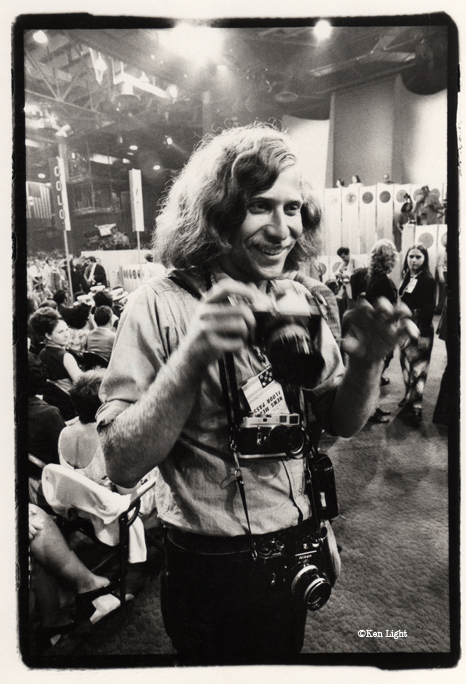
Professor Ken Light in 1972.
Ken Light will be photographing the Republican Convention in Milwaukee in July. At age 21, Light photographed the 1972 Republican Convention in Miami Beach when Richard Nixon was nominated for his second term! A retrospective of Light’s photos taken between 1969–1995 — the first 25 years of his career — opens at the Bronx Documentary Center in New York on October 10. He is quoted in Quill for a story on photo manipulation.
Elena Conis published The Public Health Community Needs to Tell the Whole Truth About the History of Measles for TIME magazine. Her book “How to Sell a Poison” won the William H. Welch Medal from the American Association for the History of Medicine and was a finalist for the National Association of Science Writers book award.
Queena Kim produced and reported a fascinating story on Korean pop culture inspiring a Korean-language learning boom at US universities, including UC Berkeley, for “The World.”
David Barstow received an honorary degree of Doctor of Humane Letters from his alma mater Northwestern’s Medill School of Journalism in June.
Adam Hochschild published book reviews on Indonesia’s fight for independence and an atrocity committed by US troops in the Philippines, in the Atlantic and the Times Literary Supplement in England. Read them here.
Bernice Yeung, managing editor of the Investigative Reporting Program, was invited to Berlin to talk about her seminal book “In a Day’s Work: The Fight to End Sexual Violence Against America‘s Most Vulnerable Workers,” a finalist for the 2019 Pulitzer Prize for General Nonfiction, as the ILO Convention on eliminating violence and harassment in the workplace went into effect in Germany.
Nick Romeo spent June as a visiting fellow at the London School of Economics, with invited lectures from Oxford and University College London as well. He was also recently selected as one of the Omidyar Network’s reporters in residence to support his ongoing reporting on reimagining capitalism. He recently wrote a story on tenant unions for The Guardian and an essay on Jack London, class, and the purpose of the liberal arts for Aeon.
Alumni News
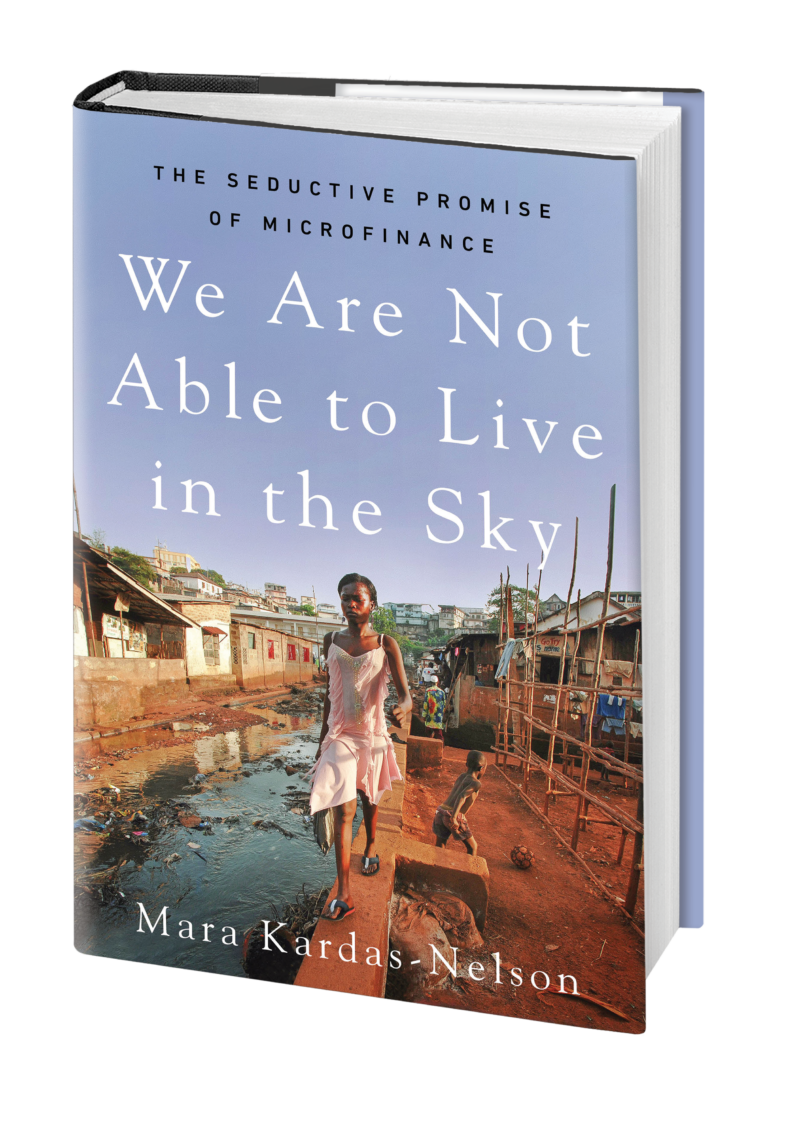
Mara Kardas-Nelson‘s (’20) new book “We Are Not Able to Live in the Sky: The Seductive Promise of Microfinance” came out June 11. It’s a deeply reported work of journalism that explores the promises and perils of microfinance, told through the eyes of those who work in small-scale lending and women borrowers in West Africa. We’ll be hosting her in conversation with Lecturer Adam Hochschild on September 18.
“The Strike,” a new feature documentary incubated in the school’s Investigative Reporting Program, by JoeBill Muñoz (’19) and Lucas Guilkey (’19) recounts the historic non-violent uprising against long-term solitary confinement by some 30,000 people incarcerated in California prisons in 2013. More than a dozen students and alumni contributed. The film is already garnering acclaim. Read Marlena Telvick’s interview with them here. We’ll be hosting them in conversation with Professor David Barstow on August 29.
Emma Schwartz (’19) is the story producer on the documentary “Power of the Dream,” an unlikely true story about women’s basketball and politics, which premiered at the Tribeca Film Festival in June.
Meg Shutzer (’20) and Brandon Yadegari Moreno‘s (’20) new documentary “Mother” screened at Frameline, the San Francisco International LGBTQ+ Film Festival in June.
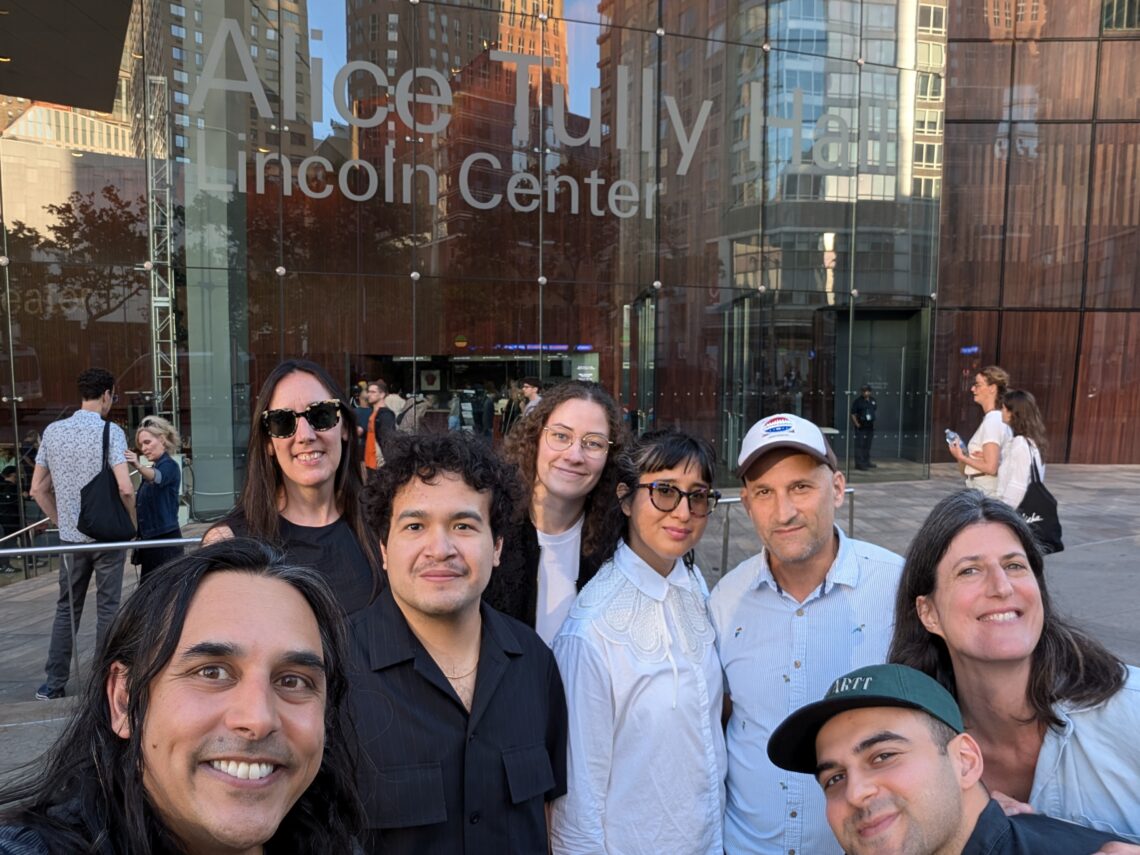
New York alums gather outside filmmaker Sam Green’s event at Lincoln Center. Photo courtesy of Jigar Mehta (’05).
Oscar-nominated documentary filmmaker Sam Green (’93) brought his “live documentaries” together for the first time at Lincoln Center, featuring his signature mix of live music and narration on the human condition. The triple feature included the globally acclaimed “32 Sounds” with JD Samson, “The Love Song of R. Buckminster Fuller” with Yo La Tengo, and “A Thousand Thoughts,” with the Kronos Quartet.
Nazmul Ahasan (’23) won a Sigma Award, which recognizes the best data-driven projects of the past year, for “Body Count: Extrajudicial Executions in Bangladesh,” published by Netra News.
Corey Antonio Rose (’23) was named the Michael J. Feeney Emerging Journalist of the Year from The National Association of Black Journalists (NABJ). Rose is a producer for NPR’s “It’s Been A Minute,” where his work explores the intersections of public health, policy and culture.
“The Grab,” an international feature length documentary that uncovers the money, influence and alarming rationale behind covert efforts to control the most vital resource on the planet, was released in theaters by Magnolia Pictures and Participant Media in June. Alums Mallory Newman (’19), JoeBill Munoz (’19) and Emma Schwartz (’19) are associate producers on the film and many other alumni assisted in the production that is streaming on multiple platforms here.
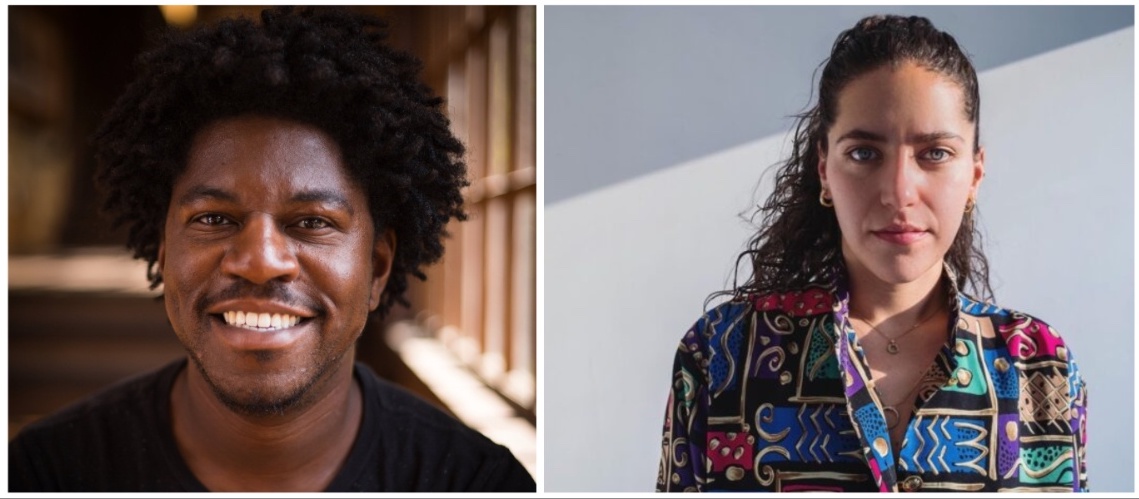
Serginho Roosblad and Marian Carrasquero
Serginho Roosblad‘s (’18) “Documenting Police Use of Force” aired on FRONTLINE in April. The film follows a group of Associated Press journalists as they set out to document how many people die after police officers use restraint tactics not meant to kill. Read our interview with him here. Marian Carrasquero (’19) is the film’s associate producer. We’ll be screening the documentary and hosting a conversation between Roosblad and Berkeley Journalism Advisory Board member Ron Nixon, AP vice president, news and head of investigations, in October. Details to come.
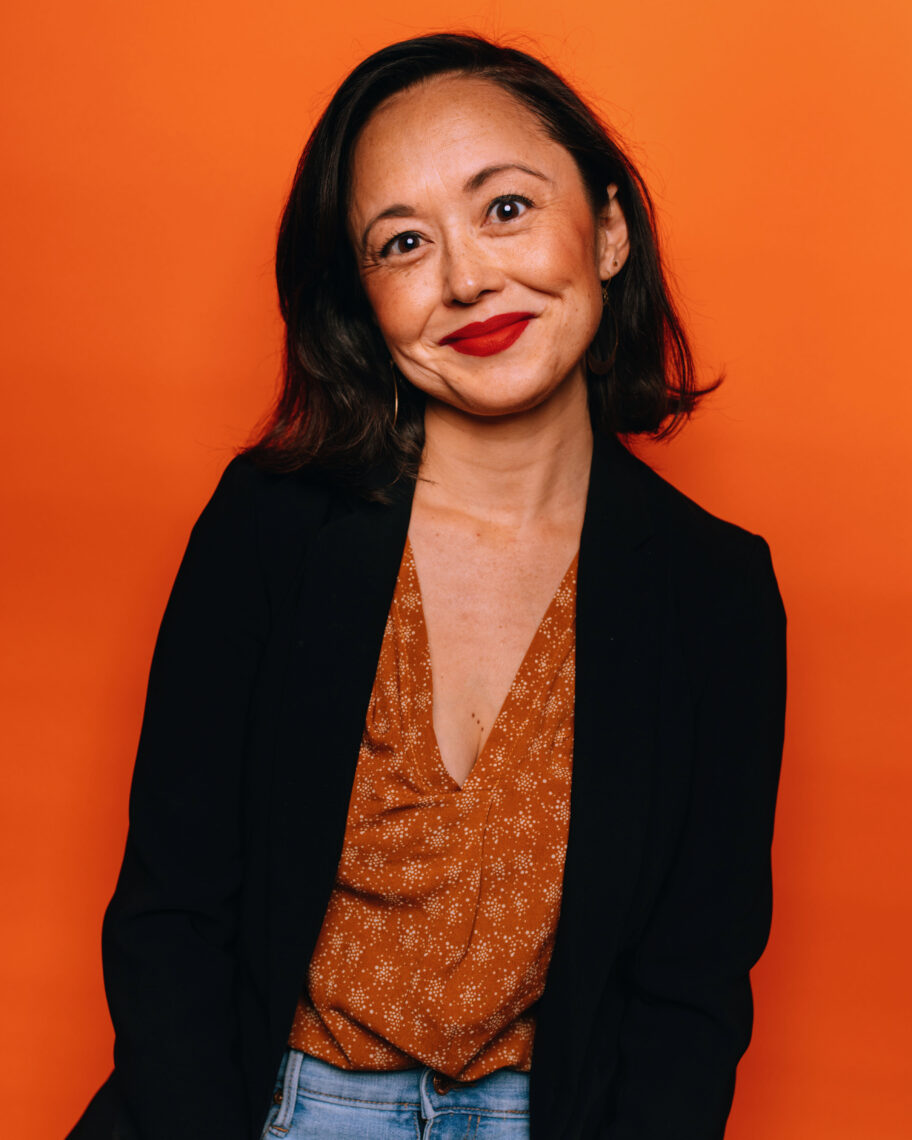
Jun Stinson Yamagishi
Jun Stinson Yamagishi (’11) story produced the Showtime series, “The World According to Football” — narrated and executive produced by Trevor Noah — that won a Sports Emmy from The National Academy of Television Arts & Sciences.
Lauren Capps (’12) produced the four-part docuseries “Deadlocked: How America Shaped the Supreme Court” for Trilogy Films and Showtime/Paramount + honored in May by The Television Academy. Watch the trailer here.
Science writer Heather Hansen‘s (’99) latest book, “Solitude: The Science and Power of Being Alone” (Cambridge University Press) was released in the US and UK in April.
Arijit (Ari) D. Sen (’22) was named a finalist for the Livingston Award in the national reporting category for “Bleeding Out,” a series of stories on preventable trauma deaths for the Dallas Morning News, in partnership with the San Antonio Express-News.
Join Us
Thanks to all of you who have attended our many engaging events over the past year, from talks with Michelle Goldberg (’98) to Rebecca Solnit (’84) to Michael Pollan. There’s a lot more to come this fall. Sign up here to stay connected with us for events and other happenings.
About this letter: The Dean’s Quarterly News is sent to alumni, donors, students, faculty, media partners and others in Berkeley Journalism’s broad community. If you’d like to follow ongoing developments in real-time, find us on Facebook, Instagram, LinkedIn, YouTube and X. Have alumni news or accomplishments to share? Please send it, along with a high-res headshot and bio to journalism@berkeley.edu. Are you hiring? Please reach out to career.services@berkeley.edu. Interested in our summer sessions? Email journalismminor@berkeley.edu. Want to learn more about donating to the school? Contact stevekatz@berkeley.edu.
